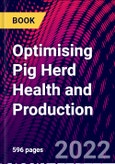Key Features:
- Summarises the wealth of research on optimising pig herd health for increased protection against major diseases, including ASF and PRRS
- Reviews recent advances in understanding gut function and immunity in pigs, including the development of nutritional strategies to boost immune function and resistance to disease
- Explores key challenges facing pig production, including breeding disease resistant pigs with a narrowing genetic base and the development of fungicide resistance
Table of Contents
About the Editor
Prof. Dr. Isabel Hennig-Pauka is the Director of the Bakum Field Station for Epidemiology at the University of Veterinary Medicine, Germany. She was previously Head of the University Clinic for Swine, University of Veterinary Medicine, Vienna, Austria.Dr Jeroen Dewulf is a full Professor in Veterinary Epidemiology at the Faculty of Veterinary Medicine of Ghent University. His main research interests are quantitative epidemiology and control of zoonoses with a specific emphasis on antimicrobial use and resistance in animals as well as the prevention of epidemic and endemic diseases with a focus on the application of biosecurity measures. He is the head of the Veterinary Epidemiology Unit and is supervising over 10 Ph.D. students who are doing research in the field of veterinary epidemiology. He is (co-)author of over 300 A1 publications in the field of veterinary epidemiology with an H-index of 45. He is the principal author of the annual Belgian report on Antimicrobial Consumption in Animals (BelVetSac) and chair of the JPI-AMR network on the quantification of antimicrobial consumption in animals at herd level. Since 2009 he is a member of the scientific committee of the Belgian federal food agency and is the founder and chair of the board of the center of expertise on antimicrobial use and resistance in animals (AMCRA) in Belgium.
Dr Joaquim Segalés is Professor in the Faculty of Veterinary Medicine at the Universitat Autònoma de Barcelona (UAB) and Researcher at the Centre de Recerca en Sanitat Animal (IRTA-CReSA), Spain.
Dr Dominiek Maes is Professor of Porcine Health Management in the Faculty of Veterinary Medicine at Ghent University, Belgium.
Professor Olli Peltoniemi is Professor of Domestic Animal Reproduction and Dean of the Faculty of Veterinary Medicine at the University of Helsinki, Finland. He is also a board member of TINE, the Research Council of the University of Helsinki in 2014. He has been in charge of Helsinki One Health since its creation in 2017. His research interest include – reproductive health in all species and reproductive biology especially in the pig, cattle and dogs.








